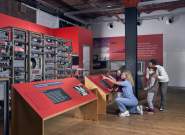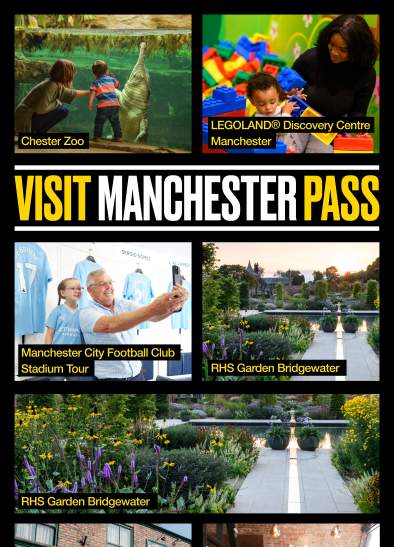
Manchester Content Curator Simon Donohue in conversation with neo-soul duo Children Of Zeus, part of the CitizensofMCR campaign from Marketing Manchester.
At the Manchester International Festival last month, there was one act who opted to use their time on the Festival Square stage as a platform for other talent in the city.
That was Children of Zeus, who seem to have become godfathers of the city’s simmering neo-soul scene, winning friends and plaudits alike.
They are touring nationally and internationally pretty much non-stop and yet have no formal major record deal - part of a new breed of entrepreneurial artists making their own way in an industry no longer equipped to nurture talent of their type.
It feels like something very special is happening in Manchester and they are at the heart of it.
Marketing Manchester is currently producing a Manchester music documentary – find out more here – and spent the day of the Distractions: Sound City Manchester music conference at MIF talking to some of the acts who are enjoying success of their own.
Children of Zeus was a common theme, with namechecks from the likes of Chunky (one of 14 members of Levelz); the multi-talented singer, actor and host Jenna G and emerging artists including Prima.
For the uninitiated, Children of Zeus is a soul project from two of Manchester’s most respected artists Konny Kon and Tyler Daley.
Konny Kon is a DJ, MC and beatmaker best known as one third of Broke’N’English alongside fellow Mancunians DRS and Strategy.
Tyler Daley, also known as Hoodman, went from being a respected MC and actor to one of the most in demand soul singers of recent times, lending his vocals and writing credits to music from Goldie, LSB, Soul II Soul‘s Caron Wheeler, Lenzman, Lisa Mafia, Bugzy Malone, and more.
Despite moving in the same circles of Manchester music, it took a chance meeting at a festival in France to bring them together.
Earlier this year, Children of Zeus joined the #CitizensofMCR campaign from Marketing Manchester.
This is the full transcript of that interview:
Tell me your first memories of Manchester.
Tyler: I grew up in South Manchester, in Whalley Range. I moved from London when I was quite young to Whalley Range, which is very leafy, and green but also quite dangerous at the time.
So it was a bit of a blend of nice big houses from the Victoria era, with lots of crime, lots of danger, lots of fun times.
But all in all, it was a quite nice balance to be fair. Which is quite a weird thing to say with all the rough side, but it keeps you grounded… makes times interesting but also it was a nice area to look at.
Konny: I’m from north Manchester. From Blackley, Moston, in between those two areas. It was kinda typical of UK council estates I would say: criminality mixed with a really close sense of community. Just a decent blend of different characters really.
How did you get into music?
Tyler: I only ever wanted to do music. I wasn’t interested in anything else. I wasn’t interested in sports. I wasn’t interested in films and TV. I’ve only ever been obsessed with music since I was younger. And I didn’t think it was anything I could make a career out of, but it was the only thing I was interested in.
Konny: I was into football as well. Naturally, where I grew up, you just gravitated towards football; kicking a can around the street. There wasn’t anything else to do. So from football to anything else around the estate that you didn’t need a lot to do it with. Or just a little ball or whatever. Bits of sport. I’ve always been interested in music but there haven’t really been many examples of people doing things in music from where I’m from. I didn’t really think it was a possibility until I got older.
What was your earliest inspiration in music?
Tyler: The thing that inspired me was that at the school I went to, there was a guy who was a few years older than us called MC Buzz B, who got signed to Virgin, I think, when we were in primary school.
Up until that point there weren’t that many people who ever made it. And for years after there weren’t many people who made it. But at that point, there was one guy who always stuck out to me, and that was MC Buzz B.
A teacher brought a tape into assembly and said: ‘this guy, used to go to this school, he’s just been signed by Virgin, he’s doing quite well for himself’.
And at that point, quite a few of us went: ‘Oh, this guy’s rapping. We all kind of rap, don’t know much about hip hop, bit young to know much about it, but we know it exists. And there’s a guy who came from our school who’s done something with it.’ Quite a few of us were quite inspired by it.
As years go on, a few drop off and find other interests. But others stuck it out. And for me personally, a few of us got an opportunity to go to a studio, when we’d just left school, and made a demo, which was absolutely terrible.
But it just sparks you off and you think ‘this is enjoyable and would like to do it again’. So, for me it was that spark of MC Buzz B, which inspire quite a few of us. And then it just builds, from going to a studio, to getting a bit older and going to an open mic, and people saying, ‘that was quite good’, and then you get your first paid show. It just all builds form there. So MC Buzz B was the spark for me.
Konny: A similar story for me. Obviously, not Buzz B, I’m from a different side of town so I wasn’t really aware of that. But I was always personally interested in music. Kept it to myself. Didn’t think I could make anything of it. But there was a group called Northside.
They were an indie band, following in the footsteps of The Stone Roses and Happy Mondays, and they were the next thing, they were going to do something. They never really took the step. The drummer was a friend of my dad’s.
The stories he used to tell me and the stuff I used to hear from him made me think, ‘ok, ok, like there’s a possibility’, not just for hip hop. But it just gave me that little spark that it was possible. And the same thing happened to me when I left primary school. We got an opportunity through a youth club to go into a recording studio. As soon as I got in there, I just felt really comfortable and I just felt, ‘This is where I’m supposed to be’. Yeah, that was probably the main spark.
How did you get together?
Konny: I had a group with two other guys, DRS and Strategy, called Bodyrock. I’d never met Tyler, but we both got booked for a show in France, the same show on the outskirts of Paris. So we met in France. We decided to meet when we got back to Manchester. It went from there. We recorded a few songs. We then connected a few years later and decided to make a bit more music. That was just a one off. But it all came from meeting in France and me seeing him for the first time on stage.
Tyler: The collaboration was all from our love for music as well. Being in music, you meet a lot of people who are in the same game. But it’s rare to meet people with tastes aligned to yours. We grew up on the same type of music. We grew up on Manchester pirate radio. And that educated us on our music. When we first got together and started having conversations about the type of stuff we were into, I was really taken aback to find someone who was the same age as me and liked that music, because the music we were into was probably a lot more mature than we were at the time. The fact that he was into it and he knew all the name of the songs and he actually had the songs… That was the bond that brought us together and that’s the spark for Children of Zeus, I would say.
Was there a big plan to work together?
Konny: There was a little plan because at the time, I’d stopped working with the group I was working with. Tyler was hitting a bit of a brick wall where he was going. At the time, Manchester music had really started taking off as far as bass music, grime, drum ‘n’ bass.
It was music for clubs more than a downtempo slow, soulful, hip hop sound. Not that no one was doing it, but no-one to a level that people outside music cared.
This was all we knew and it would have been a bit false of us to try and make music that we weren’t, you know, really aligned with. So we had a plan to stick to our guns and stick to the music we were used to doing. We thought that eventually, enough people would gravitate towards us and carried on doing what we’d been doing.
How did you decide on your musical style?
Tyler: We always listened to music through radio, so it wasn’t like we got our fix through going to nightclubs. A lot of people got into music through raving, stuff like that, but our inspiration was like none of that: it was sit in your car and listen music. There didn’t seem to be a lot of it around. That’s what I love and that’s what he loved, so we said, ‘let’s just stick to that’. Yes, I don’t know if it was down to timing or chance, but everything seemed to just work at that time, where people were ready for that again.
Why does so much good music come from Manchester?
Konny: I heard something once which is pretty interesting: that because it rains so much, all we can do is sit in the studio. I don’t know how true that is, but we do spend a lot of time in the studio rather than enjoying life.
The other thing about Manchester, and it’s not always been the case for us because we come from a hip-hop background, is that it’s very competitive. We all hated each other! We all kept ourselves to ourselves. But a few years ago, a bit of change happened where it was more, ‘let’s collaborate, let’s push each other’.
The Manchester symbol is a worker bee. And it got used a lot more by the music community, because that’s our symbol and we help the hive. The younger generation who came after us, they’re all ‘let’s be in four different groups together… if you see someone’s video coming out, we’re all going to push it online.’ Right now, what separates Manchester from most of the other cities in the UK, is that we’re all very community driven. ‘Let’s all help each other,’ 98% of people would say. The people at the top help the people at the bottom. They rise up, they help the people below them. It’s working quite well I think and I think a lot of the other cities are looking toward Manchester for that. I think Bristol probably did that before us and it was kind of blueprint for the Manchester scene. It’s not just one genre of music that’s doing that. The drum ‘n’ bass guys help the hip hop guys.
Tyler: We’re from quite a divided city at times and I think that’s probably slowed down the progress of the city and maybe this would have happened earlier. I don’t necessarily think that Manchester is a great place for artists doing something and making a success of it. I think we were overlooked a lot. I think even the likes of The Stone Roses and Oasis, who really had the run in the 1990s, didn’t have any handouts.
They came off the back off the rave scene, which we created round here: created a scene that people wanted to come and be part of us, rather than the other way round.
And we have music that’s like a fallout from that. Once you’ve finished raving, you had The Stone Roses and I think we’re kind of like the same now. Where we had all the rave stuff, the dubstep stuff and people Manchester who were doing well off their backs, because we were putting on our own nights and they did well, and students here, they go back and tell their own friends.
So I feel like it’s all built off our back. I wouldn’t advise anyone to come here and try and make it because there’s nothing here. There’s no infrastructure, it’s just that we’re resourceful. We make the most of what we’ve got.
How does it feel to be successful?
Tyler: It’s an amazing feeling because we’ve been working a long time to get anything out of it. More so, it’s a case of: ‘Right! Now, is the time to make sure it doesn’t run out and drop again.’
Back in the day, we might have been more competitive for ourselves. ‘If we’ve got it let’s keep it.’ But now, we’ve got a bit of age and maturity and have seen how things work. We can just help anybody see things that we didn’t see when we were younger. That’s the main thing, being able to affect what’s going on the city. It’s a nice place to be for that reason.
What is your relationship with Manchester?
Konny: Its tough at times, man. It’s tough for a lot of people but at the same time it’s a big city that also feels quite small. We’re in Wellington Mill right now and if we stand here for another half hour, a few people are going to walk in who know who we are, and we’re going to know who they are. And you can do that down any street in the city centre. It’s quite a close-knit community as far as the music scene is concerned, and arts. We don’t stick to our genre. It’s all one thing. The drum ‘n’ bass guys are part of our scene, the soul guys are part of the grime scene. We all work together. It’s tough but it’s also quite friendly ‘cause everyone knows each other. If you go to London, you don’t know anybody apart from your best mates.
Tyler: I reckon it’s a passionate city. One thing you could say about Manchester is that we’re passionate. Everything we do, we’re passionate. Be it sports, football, fighting, drinking, whatever it is, we’re passionate about it. And that’s what pulls us through – the passionate spirit that we have.
What is your favourite place in Manchester?
Konny: One of my favourite places in Manchester is a shop in Chorlton called Kingbee records, which is a second-hand record shop which has been around forever as far as I’m concerned. It’s run by a guy called Les, who is part of the Northern Soul scene. It’s kind of a mixture of music but you can go in there without about £2 and come out with handfuls of records. When I didn’t have as much money, I’d go and take some of my records in there and swap them for a few more. I’ve got a lot of records out of that shop with the Kingbee sticker on. It’s one of the number one places for people to visit if there into music.
Tyler: My favourite place in Manchester no longer exists and it’s Maine road, where I spent many happy days when I was a kid. Today, it’s the parks that we have, the many parks. I’ve got children, so I just like to go to a different park when the weather is nice on a rare occasion. That’s when you see the nice happy side that you don’t always see, because we just don’t have the weather. Any nice park on the right day in Manchester.
Listen to Children of Zeus on Spotify.







